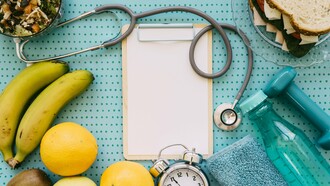In the dietary world, there are many theories, in this article we’re going to look into them and try to find out which theory holds the best.
The old-school calorie counting theory
For decades people adopted a calorie-counting method to stop gaining weight. Eat less exercise more! Basically, the approach is to add up the number of calories per serving of all the foods that we eat, then plan our menus accordingly. Only calories are measures of energy, not fat. A deficit of calories could lead to fatigue due to lack of some essential nutrients.
Blame it on the fat theory
This theory consists on burning the fat while exercising and cutting fatty foods. What we don’t realize is that when we exercise we lose mostly water and energy (calories), not fat. For a healthy weight loss, some fatty foods are essential: Olive oil, avocado, coconut oil, nuts…that help reduce weight by taking more time to digest therefore prevent overeating. Besides than giving your body the perfect nutrients to function at its best, it helps reduce inflammation, which is the root problem.
Inflammatory foods are the root cause of all diseases
Inflammation is the response of the body to end injury. That’s a good thing but it’s also the root cause of many chronical health problems! Think of it, sugar, fried foods, dairies, gluten…they all have one thing in common, they cause inflammation which could lead to diabetes, asthma, heart diseases, arthritis, cancer, cholesterol, triglyceride… The devil in disguise here, is all dairy products. People tend to forget that dairies on one hand give you calcium and proteins, and on the other cause inflammation and calcification. Of course, those are important nutrients for our body, but at which cost?
Let’s take milk as an example. Cow's milk contains calcium, proteins, and inflammations. While almond milk fights inflammation and has Omega 3 and 6 along with calcium and proteins.
The importance of blood test
A Blood test once a year is a must! Even for kids. Many kids where mistakenly diagnosed with ADHD because of a vitamin deficiency. For example, a deficiency in vitamin D can lead to mood swings, depression, cancer; an anemia can cause a foggy brain, lack of energy, insomnia, hair loss, nails cracking, depression, very weak memory… Once we follow a diet, it’s wiser to adapt a healthy one with all the essential nutrients and shaping our body should prevail as a result.
How to lose weight in 3 weeks
Breakfast
0.5L of pure water. One banana+10 raw almonds + one fruit of your choice (melon or one carrot…) blend it all with water. You can add to it raw pumpkin seeds, crunchy peanut butter, fresh ginger. (This smoothie will provide you important nutrients like calcium, proteins, fibers, omega 3&6, iron…).
Lunch
0.5L of pure water. Rice or potatoes or pasta with vegetables. All beans are full of calcium and iron, its recommended to have them at least 3 times a week.
Snack
0.5L of pure water. One fruit with raw nuts Or hummus with olive oil and olives, tomatoes, baked potatoes…
Dinner
Same as lunch. You can remove the rice in this meal for faster results.
Stay away from
Sugar, processed food, fried foods, all animal products! You can replace sugar with natural sweets like dry fruits and carob molasses…
- Try to focus on the quality instead of the quantity of the food.
- Always read the listed ingredients on products before buying. A full of chemicals product should stay out of your kitchen.
- Do not skip meals.
This is a detox diet, it takes 3 weeks to start showing results. Problems like migraine, constipation, bloating, water retention, and sinuses…will stop. After 3 months, it can start reversing some chronic diseases like cholesterol, triglycerides, arthritis, osteoporosis, asthma…
This diet will leave you slimmer without missing out on essential nutrients and boost your immune system like a strong shield facing all kinds of viruses. It’s like changing the fuel of your engine, to get the ultimate healthy state.
After those 3 months, you can go back to having dairies in your diet but not more than 3 meals a week. You can go back to eating animal products but in moderation.
- Red meat once a week.
- Chicken once a week.
- Fish every day as long as it’s not fried.
You can have one cup of coffee or one hot beverage a day (no added sugar or cow’s milk). Cheating days are important, but only once every 10 days to maintain the result.
If you choose to keep on going with a healthy vegan diet, I congratulate you for taking the wisest decision, a decision that I took 7 years ago and I can say that it was a life-changing switch.
I’ve been sick-free for 7 years now, and above all, I feel proud to be part of the change that our planet needs for a less polluted habitat for future generations.
I haven’t got any deficiency because of my vegan diet but I’m taking vitamin b12 once a month just to stay on the safe side.
Good luck!















